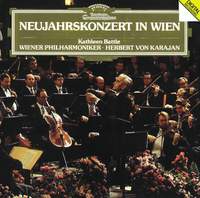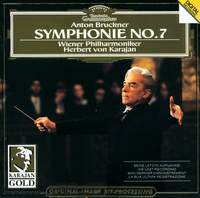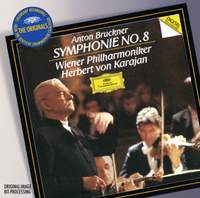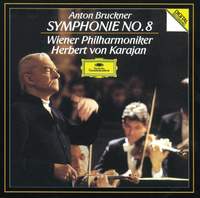Favourites,
Shelf Discovery: Karajan in Vienna
 The undoubted highlight of last year's Proms season was Bernard Haitink's magisterial farewell performance of Bruckner's Seventh Symphony with the Wiener Philharmoniker. Bowing out with Bruckner 7 and the Wiener Philharmoniker has precedent – thirty years previously, the Austrian conductor Herbert von Karajan made his final recording with the same piece and performers. Revisiting that 1989 account gave me a fine excuse to cast a fresh ear over Karajan's orchestral recording legacy with the Wiener Philharmoniker, and in particular a series of spectacular recordings he made for Decca in the late 50s to early 60s, produced by the legendary John Culshaw.
The undoubted highlight of last year's Proms season was Bernard Haitink's magisterial farewell performance of Bruckner's Seventh Symphony with the Wiener Philharmoniker. Bowing out with Bruckner 7 and the Wiener Philharmoniker has precedent – thirty years previously, the Austrian conductor Herbert von Karajan made his final recording with the same piece and performers. Revisiting that 1989 account gave me a fine excuse to cast a fresh ear over Karajan's orchestral recording legacy with the Wiener Philharmoniker, and in particular a series of spectacular recordings he made for Decca in the late 50s to early 60s, produced by the legendary John Culshaw.
Karajan's discography for Decca represents a microcosm of his recording legacy. As well as the central Austro-German repertoire of Beethoven, Brahms, Haydn and Mozart for which the Wiener Philharmoniker and Karajan are renowned, we get some unusual repertoire for the time and place – perhaps most surprisingly Adolphe Adam's ballet music for Giselle, dashed off with élan (the Wiener Philharmoniker of course no stranger to ¾ time), even if sections of the 'Apparition of Martha' are reminiscent of Richard Strauss's Ein Heldenleben rather than anything from either Johann! Both sides of the Strauss coin are well represented. Karajan's love of the lighter Strausses is perhaps overlooked these days, but he was the first conductor the Wiener Philharmoniker asked to direct the Neujahrskonzert when they decided to rotate conducting duties in 1987 – and that year's rendition remains a favourite to this day, not least for Kathleen Battle's glorious vocal contributions in Frühlingstimmen.
Richard Strauss's music was a constant companion for Karajan throughout his career, and the four tone poems here are all superb: it's a treat to hear the volcanic opening of Don Juan cleanly articulated by the strings, and his Also Sprach Zarathustra is a sonic and interpretative wonder. (No surprise, then, that this was the version that would become familiar to millions, used as it was for Stanley Kubrick's 2001: A Space Odyssey in 1968). In the central Austro-German repertoire two qualities stand out; a light, transparent sonority and a willingness to indulge his section principals (both ingredients which his recordings in Berlin arguably lacked).
A composer central to the Austro-German symphonic tradition is Bruckner, and comparing these late Vienna recordings of the Seventh and Eighth symphonies with their earlier Berlin counterparts (recorded as part of the Berlin Bruckner cycle) reveals a slight relaxation in tempo, most crucially in the adagios, where again Karajan seems more willing to share the spotlight - a case in point being the spectacular horn solo in the coda of the slow movement of Bruckner 7. Sonically, I have a preference for the Musikverein over the Philharmonie as a recording venue too, as the transcendent glow achieved in the finale of Bruckner 7 in Vienna isn't matched in Berlin - even if the harsher Philharmonie sound is perhaps a better fit for the apocalyptic opening to the finale of Bruckner 8.

In summation, to use a nautical analogy which would hopefully meet with the approval of a keen sailor such as Karajan, Bruckner's symphonic seas are navigated in Vienna in an elegant sailboat, alive to the natural waves and currents of the music, whereas in Berlin Karajan has a powerful motorboat at his disposal and understandably can't resist the temptation to open the throttle at times. Both are highly enjoyable, but the Viennese connection to Bruckner really does come through to add something special, and the additional poignancy of knowing that these were Karajan's farewell to his beloved recording medium makes these late Bruckner recordings well worth seeking out, even if you are already familiar with his Berlin Bruckner cycle.
When talking about why he preferred to conduct in Berlin over Vienna, Karajan famously stated “If I tell the Berliners to step forward, they do it. If I tell the Viennese to step forward, they do it, but then they ask why.” However, the musical fruits in Vienna are to my ears sweeter - I put this down to the fact that his relationship with the Viennese seems more collegial, based more on musical give-and-take rather than dictatorial demands. Were I asked to recommend any specific recordings from Karajan's vast and bewildering recording legacy, I would instantly point the interlocutor in the direction of the Decca recordings: they represent a 'sweet spot' between the earlier musically inspired but sonically inferior Warner recordings and the sonically superb but at times over-controlled later Berlin Philharmonic DG recordings, combining a natural orchestral sound with interpretive excellence. While his relationship in Berlin was ultimately acrimonious, Karajan never fell out of love with his compatriots, and evidence of their mutual love and respect over thirty years and more was a joy to rediscover.
Wiener Philharmoniker, Herbert von Karajan
Available Formats: MP3, FLAC
Kathleen Battle (soprano), Wiener Philharmoniker, Herbert von Karajan
Available Formats: MP3, FLAC
Wiener Philharmoniker, Herbert von Karajan
Available Formats: MP3, FLAC
Wiener Philharmoniker, Herbert von Karajan
Available Formats: CD, MP3, FLAC
Wiener Philharmoniker, Herbert von Karajan
Available Formats: MP3, FLAC







